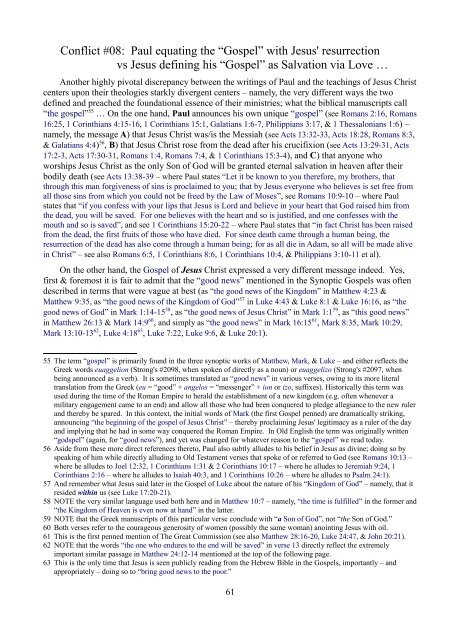The Cult of Paul
an exhaustive biblical examination of the starkly contrasting lives, values, & theologies of Jesus Christ and Paul -- Jesus' most zealous “apostle,” and the true father of the modern-day Christian church
an exhaustive biblical examination of the starkly contrasting lives, values, & theologies of Jesus Christ and Paul -- Jesus' most zealous “apostle,” and the true father of the modern-day Christian church
Create successful ePaper yourself
Turn your PDF publications into a flip-book with our unique Google optimized e-Paper software.
Conflict #08: <strong>Paul</strong> equating the “Gospel” with Jesus' resurrection<br />
vs Jesus defining his “Gospel” as Salvation via Love …<br />
Another highly pivotal discrepancy between the writings <strong>of</strong> <strong>Paul</strong> and the teachings <strong>of</strong> Jesus Christ<br />
centers upon their theologies starkly divergent centers – namely, the very different ways the two<br />
defined and preached the foundational essence <strong>of</strong> their ministries; what the biblical manuscripts call<br />
“the gospel” 55 … On the one hand, <strong>Paul</strong> announces his own unique “gospel” (see Romans 2:16, Romans<br />
16:25, 1 Corinthians 4:15-16, 1 Corinthians 15:1, Galatians 1:6-7, Philippians 3:17, & 1 <strong>The</strong>ssalonians 1:6) –<br />
namely, the message A) that Jesus Christ was/is the Messiah (see Acts 13:32-33, Acts 18:28, Romans 8:3,<br />
& Galatians 4:4) 56 , B) that Jesus Christ rose from the dead after his crucifixion (see Acts 13:29-31, Acts<br />
17:2-3, Acts 17:30-31, Romans 1:4, Romans 7:4, & 1 Corinthians 15:3-4), and C) that anyone who<br />
worships Jesus Christ as the only Son <strong>of</strong> God will be granted eternal salvation in heaven after their<br />
bodily death (see Acts 13:38-39 – where <strong>Paul</strong> states “Let it be known to you therefore, my brothers, that<br />
through this man forgiveness <strong>of</strong> sins is proclaimed to you; that by Jesus everyone who believes is set free from<br />
all those sins from which you could not be freed by the Law <strong>of</strong> Moses”, see Romans 10:9-10 – where <strong>Paul</strong><br />
states that “if you confess with your lips that Jesus is Lord and believe in your heart that God raised him from<br />
the dead, you will be saved. For one believes with the heart and so is justified, and one confesses with the<br />
mouth and so is saved”, and see 1 Corinthians 15:20-22 – where <strong>Paul</strong> states that “in fact Christ has been raised<br />
from the dead, the first fruits <strong>of</strong> those who have died. For since death came through a human being, the<br />
resurrection <strong>of</strong> the dead has also come through a human being; for as all die in Adam, so all will be made alive<br />
in Christ” – see also Romans 6:5, 1 Corinthians 8:6, 1 Corinthians 10:4, & Philippians 3:10-11 et al).<br />
On the other hand, the Gospel <strong>of</strong> Jesus Christ expressed a very different message indeed. Yes,<br />
first & foremost it is fair to admit that the “good news” mentioned in the Synoptic Gospels was <strong>of</strong>ten<br />
described in terms that were vague at best (as “the good news <strong>of</strong> the Kingdom” in Matthew 4:23 &<br />
Matthew 9:35, as “the good news <strong>of</strong> the Kingdom <strong>of</strong> God” 57 in Luke 4:43 & Luke 8:1 & Luke 16:16, as “the<br />
good news <strong>of</strong> God” in Mark 1:14-15 58 , as “the good news <strong>of</strong> Jesus Christ” in Mark 1:1 59 , as “this good news”<br />
in Matthew 26:13 & Mark 14:9 60 , and simply as “the good news” in Mark 16:15 61 , Mark 8:35, Mark 10:29,<br />
Mark 13:10-13 62 , Luke 4:18 63 , Luke 7:22, Luke 9:6, & Luke 20:1).<br />
55 <strong>The</strong> term “gospel” is primarily found in the three synoptic works <strong>of</strong> Matthew, Mark, & Luke – and either reflects the<br />
Greek words euaggelion (Strong's #2098, when spoken <strong>of</strong> directly as a noun) or euaggelizo (Strong's #2097, when<br />
being announced as a verb). It is sometimes translated as “good news” in various verses, owing to its more literal<br />
translation from the Greek (eu = “good” + angelos = “messenger” + ion or izo, suffixes). Historically this term was<br />
used during the time <strong>of</strong> the Roman Empire to herald the establishment <strong>of</strong> a new kingdom (e.g. <strong>of</strong>ten whenever a<br />
military engagement came to an end) and allow all those who had been conquered to pledge allegiance to the new ruler<br />
and thereby be spared. In this context, the initial words <strong>of</strong> Mark (the first Gospel penned) are dramatically striking,<br />
announcing “the beginning <strong>of</strong> the gospel <strong>of</strong> Jesus Christ” – thereby proclaiming Jesus' legitimacy as a ruler <strong>of</strong> the day<br />
and implying that he had in some way conquered the Roman Empire. In Old English the term was originally written<br />
“godspel” (again, for “good news”), and yet was changed for whatever reason to the “gospel” we read today.<br />
56 Aside from these more direct references thereto, <strong>Paul</strong> also subtly alludes to his belief in Jesus as divine; doing so by<br />
speaking <strong>of</strong> him while directly alluding to Old Testament verses that spoke <strong>of</strong> or referred to God (see Romans 10:13 –<br />
where he alludes to Joel 12:32, 1 Corinthians 1:31 & 2 Corinthians 10:17 – where he alludes to Jeremiah 9:24, 1<br />
Corinthians 2:16 – where he alludes to Isaiah 40:3, and 1 Corinthians 10:26 – where he alludes to Psalm 24:1).<br />
57 And remember what Jesus said later in the Gospel <strong>of</strong> Luke about the nature <strong>of</strong> his “Kingdom <strong>of</strong> God” – namely, that it<br />
resided within us (see Luke 17:20-21).<br />
58 NOTE the very similar language used both here and in Matthew 10:7 – namely, “the time is fulfilled” in the former and<br />
“the Kingdom <strong>of</strong> Heaven is even now at hand” in the latter.<br />
59 NOTE that the Greek manuscripts <strong>of</strong> this particular verse conclude with “a Son <strong>of</strong> God”, not “the Son <strong>of</strong> God.”<br />
60 Both verses refer to the courageous generosity <strong>of</strong> women (possibly the same woman) anointing Jesus with oil.<br />
61 This is the first penned mention <strong>of</strong> <strong>The</strong> Great Commission (see also Matthew 28:16-20, Luke 24:47, & John 20:21).<br />
62 NOTE that the words “the one who endures to the end will be saved” in verse 13 directly reflect the extremely<br />
important similar passage in Matthew 24:12-14 mentioned at the top <strong>of</strong> the following page.<br />
63 This is the only time that Jesus is seen publicly reading from the Hebrew Bible in the Gospels, importantly – and<br />
appropriately – doing so to “bring good news to the poor.”<br />
61

















